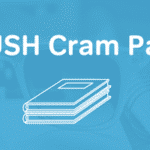
The process is pretty simple: the more you study, the better prepared you are. The better prepared, the higher your chances of successfully passing your APUSH exam. Increase your chances of scoring high on your exam by not only studying for APUSH, but studying smarter.
Use our US History study guide to help you study smarter for APUSH by:
- Clearly identifying target goals
- Outlining historical themes and time periods
- Maximizing the effectiveness of your study time
1. Identify target goals
The first step of our US History study guide is to identify your APUSH academic strengths and weaknesses. Just as there are time periods and historical events that you understand more clearly than others, there are also concepts that just didn’t “stick” the first time around. Adjust your study plan to focus more on areas you currently struggle with, and less on areas you already know well.
How to determine your APUSH strengths and weaknesses
The easiest way (although certainly not the fastest) to determine your current APUSH knowledge base is to take a full-length practice test. Although rather time consuming, the results from your practice test provide an accurate picture of which areas need the most attention during study time.
You write a total of 5 essays throughout your entire APUSH exam! Because essay writing incorporates complex English skills in addition to APUSH content knowledge — such as timed writing, creating a thesis statement, citing evidence, developing an argument — many students struggle with these portions of the test. So pay particular attention to your essay writing skills!
Creating target study goals
Base your study goals on the results of your practice exam. Your study plan should not only include an overall review of every APUSH chapter, but also highlight any additional areas that scored low during your practice test. For example, a typical study week may be 2-3 days reviewing chapter course notes, plus one extra day focusing specifically on The Gilded Age. The following week, the extra study day may change topics to include a different theme. It all depends on your personal study goals.
2. Outline historical themes and time periods
The next step of our US History study guide involves APUSH course notes. Most students have awesome course notes from their own APUSH classes, but if you prefer to use notes other than your own, there are many options available online. View our favorite course notes here.
Regardless of which course notes you use — personal or publishing company — your goal remains the same; to format the notes into a workable overview of APUSH themes and time periods. Again, the most effective option for studying is to create this outline yourself. Follow these step-by-step instructions to format your course notes into a workable study method.
Supplement your course notes with an overview of APUSH themes and time periods. Khan Academy provides a US History study guide sheet that incorporates each of the major US History themes into one single page.
3. Maximize your study time
The last step of our US History study guide focuses on study time. “Smart” studying is a strategy employed by many of the most successful students. By studying smarter, you increase the amount of information you effectively review, which means you also increase your potential for a higher APUSH score.
Select quality materials
The APUSH exam was recently updated for 2018. Make sure the materials you use (whether online or in a book) reflect those changes accurately. While many materials online may not be updated quite yet, they still are a valuable resource. Visit some of our favorite test prep materials to help get you started.
Test yourself often
To rev up your learning, “test” yourself while studying. Whether online or in real life, there are so many ways to self-test, you never have to worry about getting bored. Try flashcards, practice tests, or review games.
Vary your study methods
Don’t get stuck in a study rut. Changing up how you study engages your mind and helps maintain focus during study time. Experiment with various study methods and see what you find most useful. Our study tips may be helpful in getting started.



